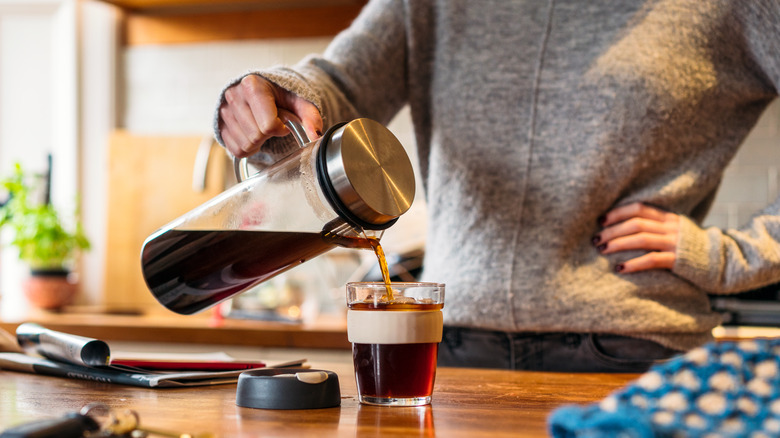For The Best Cold Brew Coffee, Strain The Grounds Very Slowly
Cold brew's intense caffeine content is perfect for those who require a strong jolt to start the day — or make it through the midday doldrums. And while its popularity may soar in hot weather, the concentrated nature of cold-brewed coffee makes it the ideal year-round drink for many people. Even better, you don't need any special equipment to make it. Just grab a jar or pitcher, some grounds, and water, and you're all set. In fact, the hardest part is the waiting.
It generally takes a minimum of 24 hours to properly brew the cold steeped coffee. After all that time, the last thing you want to do is rush through the straining process. Doing so can absolutely destroy the smooth, delicious flavor that you've waited for so patiently. So don't ruin it by failing to exercise the same restraint during the filtering process — take your time and let it happen at its own pace. As tempting as it might be to squeeze the cheesecloth or press the grounds into the fine mesh filter, don't do it! The result will be acrid and gross. There's also a good chance you'll end up with grounds in your coffee, not exactly something to look forward to.
Options for filtering cold brew coffee slowly
For the best taste and quality, filter cold brew after 24 to 48 hours. Not only does this remove the grounds and stop the brewing process, but it also rids the beverage of any undesirable residue and accompanying bitterness. Taking your time will ensure clarity and a clean finish.
Different methods will have different results — and require varying levels of patience. Paper filters take the longest, as they're the least porous. But they also filter the most out. On the other hand, a fine mesh strainer or cheesecloth will allow more of the coffee's natural oils through, resulting in a stronger taste and cloudier body. The brewing and filtering process can be combined in one piece with a French press, but you'll want to be very careful when depressing the plunger so that you don't squeeze the actual grounds and release their bitterness. You might still end up having to strain cold brew made this way since the coffee grounds have a propensity for escaping French press filters.
Don't think you'll be able to refrain from squeezing, wringing, pressing, or otherwise rushing through the straining process? For those who don't have the patience to filter slowly, cold brew coffee bags can help. The bags — which come in pre-filled and reusable versions — make straining as easy as removing the bag full of grounds from finished cold brew. There are also paper filters that work with specific home cold brew systems.
Avoiding other common causes of bitterness in cold brew
Sometimes it doesn't matter how careful you are in straining your cold brew, it still comes out bitter and off. There are two main reasons why this happens, so you'll want to take note to avoid them the next time you brew up a batch. If the coffee you used was too fine, then bitterness is pretty much guaranteed. This is not the time to break out the espresso grind, rather go with coarsely ground beans — with medium-coarse being ideal. Finer grounds not only release too many tannic acids, but they're more likely to make it past the filter and into the final cup of coffee.
The other major problem that can cause bitter cold brew is over-extraction. Put simply, this means the coffee grounds were left too steep for too long. Avoid this by cutting the brewing time on the subsequent batch. In the interim, cream and sweetener can be used to course-correct the bitter brew.


